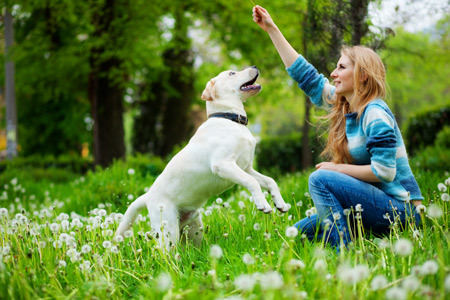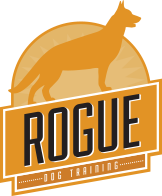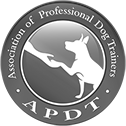ABCDT Certified Dog Trainer Shares Insights
 Rogue Dog Training wants you and your dog to have a happy relationship for years to come. Our lifetime, free email and phone support for graduates of our canine behavior classes is a great resource to keep your dog on the straight and level. Our blog is also available for tips, tricks and insights into reinforcing good behavior. Learn about nutrition, pet health concerns, dog training tips. This blog does not replace our dog training classes, but is an excellent supplement and refresher for dogs needing a behavior boost. Read on for expert advice from Rogue Dog Training.
Rogue Dog Training wants you and your dog to have a happy relationship for years to come. Our lifetime, free email and phone support for graduates of our canine behavior classes is a great resource to keep your dog on the straight and level. Our blog is also available for tips, tricks and insights into reinforcing good behavior. Learn about nutrition, pet health concerns, dog training tips. This blog does not replace our dog training classes, but is an excellent supplement and refresher for dogs needing a behavior boost. Read on for expert advice from Rogue Dog Training.
Rogue Dog Training’s Steve Terwilliger is ABCDT certified and a member of APDT, but he is not and does not intend to portray himself as a veterinarian or animal nutritionist. Any advice for your pet’s heath or diet should be taken as a guideline from a certified dog trainer interested in promoting the well-being of your pet. Always consult with your veterinarian or a certified animal nutritionist if you have a serious health concern and before making any major changes in a dog’s diet.
Professional Dog Training in Southeast Wisconsin
Rogue Dog Training proudly provides expert dog training services across Southeast Wisconsin, including in the communities of Brookfield, Brown Deer, Cedarburg, Cudahy, Dousman, Franklin, Hartland, Menomonee Falls, Mequon, Milwaukee, Mukwonago, Muskego, New Berlin, Oak Creek, Oconomowoc, Sussex, Slinger, Waukesha, West Allis, Whitefish Bay, and beyond!
Contact an ABCDT certified dog trainer at Rogue Dog Training to get your puppy behaving properly.
Date: May 1, 2018
Rogue Dog Training is seeking a Certified Dog Trainer or an individual who is in pursuit of a dog training certification, through an accredited vocational school and/or legitimate certification organization and is nearing completion. A four year degree is preferred but not required. The individual will meet with potential clients for the initial co...
Continue Reading
Date: Oct 20, 2017
How much is training?
The cost of training is dependent on the service you are in need of. Please email for the most accurate pricing information.
How much is the consultation?
The consultation is 100% free with no obligation! However, you must be at least 18 years old or have a participating adult present.
What is the best way to c...
Continue Reading
Date: Feb 19, 2015
Reward Based Dog Training Similar to Therapy?
Great dog trainers are using an abbreviated variation of cognitive, rational-emotive and cognitive behavioral therapies. Educated and certified dog trainers in one form or another are implementing proven techniques similar to that of therapists! Think of it this way, in the psychiatric profession, ther...
Continue Reading
Date: Nov 21, 2014
This is the complete list of food rewards we recommend and use for our reward-based training. Our training philosophy is rooted in methods that benefit the mind, bodyand spirit. For this reason, we made a careful selection of manufacturers that are both trusted and respected. We would only feed your pet what we feed ours, with 100% confidence....
Continue Reading
Date: Aug 15, 2014
This has shown to be a very useful technique especially for those struggling with housebreaking. Potty training can be more of a struggle for some people and trust me, you're not alone. This technique has helped a lot of people who have difficulty picking up on the signs dogs give that they need to go outside and relieve themselves. For others who ...
Continue Reading
Date: Jun 23, 2014
Have a dog that counter surfs? Won't leave you alone when making dinner? This could be the solution for you. As with any training program I offer from Basic Obedience to Unwanted Aggression Reduction, I utilize a treatment plan. The purpose of a treatment plan is to break up the problem into sections rather than haphazardly dive in without any rhym...
Continue Reading
Date: Apr 16, 2014
This section explains the terms I use on a frequent basis and is the base of my dog obedience classes. There are a lot of terms used while training a dog, but these are the most common and are often misunderstood.
Food Lure
The importance of using a food lure is that it gives you the ability to guide the dog into many positions. This technique is...
Continue Reading
Date: Apr 8, 2014
Loose Leash Walking vs Heel
Loose leash walking is an extremely important skill for all dogs to learn but it is often confused with the heel command. Both are included in basic dog obedience classes, but people still tend to blend them together. Loose leash walking is getting your dog to walk on a leash without any tension in it. The distance the ...
Continue Reading
![]() Group classes are currently unavailable. Please check back soon for future updates.
Group classes are currently unavailable. Please check back soon for future updates. Rogue Dog Training wants you and your dog to have a happy relationship for years to come. Our lifetime, free email and phone support for graduates of our canine behavior classes is a great resource to keep your dog on the straight and level. Our blog is also available for tips, tricks and insights into reinforcing good behavior. Learn about nutrition, pet health concerns, dog training tips. This blog does not replace our dog training classes, but is an excellent supplement and refresher for dogs needing a behavior boost. Read on for expert advice from Rogue Dog Training.
Rogue Dog Training wants you and your dog to have a happy relationship for years to come. Our lifetime, free email and phone support for graduates of our canine behavior classes is a great resource to keep your dog on the straight and level. Our blog is also available for tips, tricks and insights into reinforcing good behavior. Learn about nutrition, pet health concerns, dog training tips. This blog does not replace our dog training classes, but is an excellent supplement and refresher for dogs needing a behavior boost. Read on for expert advice from Rogue Dog Training.


